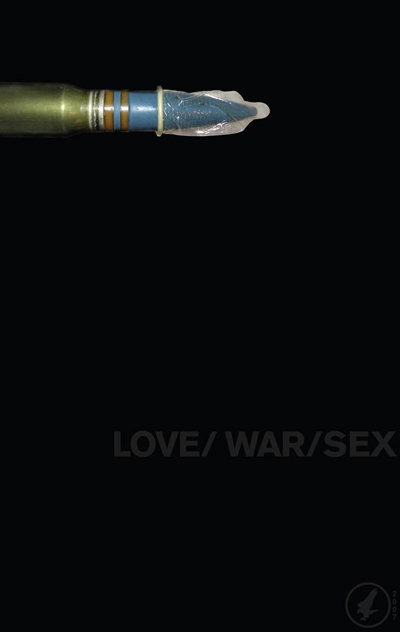Jakob Boeskov
Margot Herster
Tessa Hughes-Freeland
Fawad Khan
Ellen Lake
Rebecca Loyche
Guerra de la Paz
Francesco Simeti
Nick Waplington
Jeanette Ingberman
Papo Colo
14/12/2007
Love/War/Sex
Exit Art, New York
This exhibition connects longing with violence and love with war, imagining the business of war in all its sensual manifestations. Wants to tell you war stories through the vision of 9 international artists: Jakob Boeskov, Margot Herster, Tessa Hughes-Freeland, Fawad Khan, Ellen Lake, Rebecca Loyche, Guerra de la Paz, Francesco Simeti, Nick Waplington. Curated by Jeanette Ingberman and Papo Colo.

Jakob Boeskov, Margot Herster, Tessa Hughes-Freeland, Fawad Khan, Ellen Lake,
Rebecca Loyche, Guerra de la Paz, Francesco Simeti, Nick Waplington
Curators: Jeanette Ingberman and Papo Colo
Exit Art wants to tell you war stories through the vision of nine international
artists. Love/War/Sex considers memory, history, weapons and personal stories. As a
cultural center, our mission is to reflect what is going on in our society. We
respond to current global conflicts by presenting this exhibition, Love/War/Sex, a
comment on our culture's fascination with, and addiction to, war. The title itself
demonstrates the paradox of what war is, a combination of emotions, passions and
idealistic convictions. This exhibition connects longing with violence and love with
war, imagining the business of war in all its sensual manifestations.
Exit Art is known for its unique exhibition and installation design that heighten
the concept of the show. The installation of Love/War/Sex, conceived and designed by
Papo Colo, is an innovation in exhibition design and presentation, in part for its
inclusion of real weapons of war. Choosing these objects, these readymades,
and applying their historical contexts to the exhibition, creates an environment
that provokes and confronts the viewer with the real tools of war. The idea of
exhibiting weapons as art hearkens back to Leonardo da Vinci, who designed weapons
for a living, and allows one to experience both the extraordinary craftsmanship and
design of these killing machines.
Another installation approach was to wallpaper the exhibition space with texts of
personal experiences of the war. This allows the viewer/reader to evoke images from
the text. Here, the force of the narrative replaces the object and gives the viewer
another kind of visual imagination, creating a sacred space for meditation. Taken
from newspapers, magazines and soldiers'blogs, the texts make one think of war in
terms of these intimate stories. The juxtaposition of these weapons and the wall
papered texts creates a stage for the exhibition and the public.
Jakob Boeskov's apocalyptic video War Wizard depicts lustful soldiers and their
wizard enemy as they invade a little boy's dreams. The wizard, who
embodies at once Jesus, Osama bin Laden and an Iraqi prisoner, is tortured with sex
and violence by dancing soldiers. Margot Herster presents an insider view of
Guantanamo politics with This is an introduction tape, a video of the families of
detainees telling their relatives to trust the lawyers representing them.
Referencing sports and porn as stimulants, Tessa Hughes-Freeland's
educational video Watch Out! explains how explicit films can warp the minds of
young men. Fawad Khan fuses car culture with war imagery to create a sexy but
violent wall painting that evokes the chaos of a suicide bombing.
Ellen Lake's
short film Betty + Johnny combines digital video and home movies shot in the 1930s
and 40s to tell the story of a love lost during World War II. Rebecca Loyche's
three-channel video installation, Alls Fair in Love and War, is a disturbing
portrait of a weapons specialist who teaches military personnel how to kill. Guerra
de la Paz presents Crawl, a sculpture of a dying soldier, and The Kiss, an intimate
photograph of two soldiers embracing. Francesco Simeti's Watching the War combines
landscapes and images of the war in Afghanistan to create deceptively ornate
wallpaper. Nick Waplington's photographs juxtapose images of life at the war front
and back at home.
ABOUT EXIT ART
Exit Art is an independent vision of contemporary culture. We react immediately to
important issues that affect our lives. We do experimental, historical and unique
presentations of aesthetic, social, political and environmental issues. We absorb
cultural differences that become prototype exhibitions. We are a center for multiple
disciplines. Founded in 1982 by Directors Jeanette Ingberman and Papo Colo, Exit Art
has grown from a pioneering alternative art space, into a model artistic center for
the 21st century. Exit Art is internationally recognized for its unmatched spirit of
inventiveness. With a substantial reputation for curatorial innovation and depth of
programming in diverse media, Exit Art is always on the verge
of change.
---
Lucky Michaels
Shelter
Shelter is an exhibition of photographs by Lucky Michaels, chronicling the everyday
lives of the young LGBTQ (Lesbian, Gay, Bi-sexual, Transgender, Queer) that
temporarily inhabit Sylvia's Place, a homeless shelter located a block from Exit
Art and within the Metropolitan Community Church of New York. The shelter (named
after Queer rights activist Sylvia Rivera) is a safe haven for these homeless youths
with Michaels serving as their counselor, documenting them in moments of rest, play
and confrontation. The exhibition coincides with the release of Michael's book,
Shelter, an in-depth look at the community in Sylvia's Place. Shelter opens on
Saturday, December 15 with a special event featuring the release of Michael's book, DJ sets, and a screening of the documentary Queer Streets, produced by Lisa
Cohen.
OPENING December 15, 2007, 7-10 PM
Exit Art is located at 475 Tenth Avenue, at the corner of 36th Street.
Tuesday - Thursday, 10 - 6 pm; Friday, 10 - 8 pm; Saturday, noon - 8 pm. Closed Sunday and Monday.
There is a suggested donation of $5.



